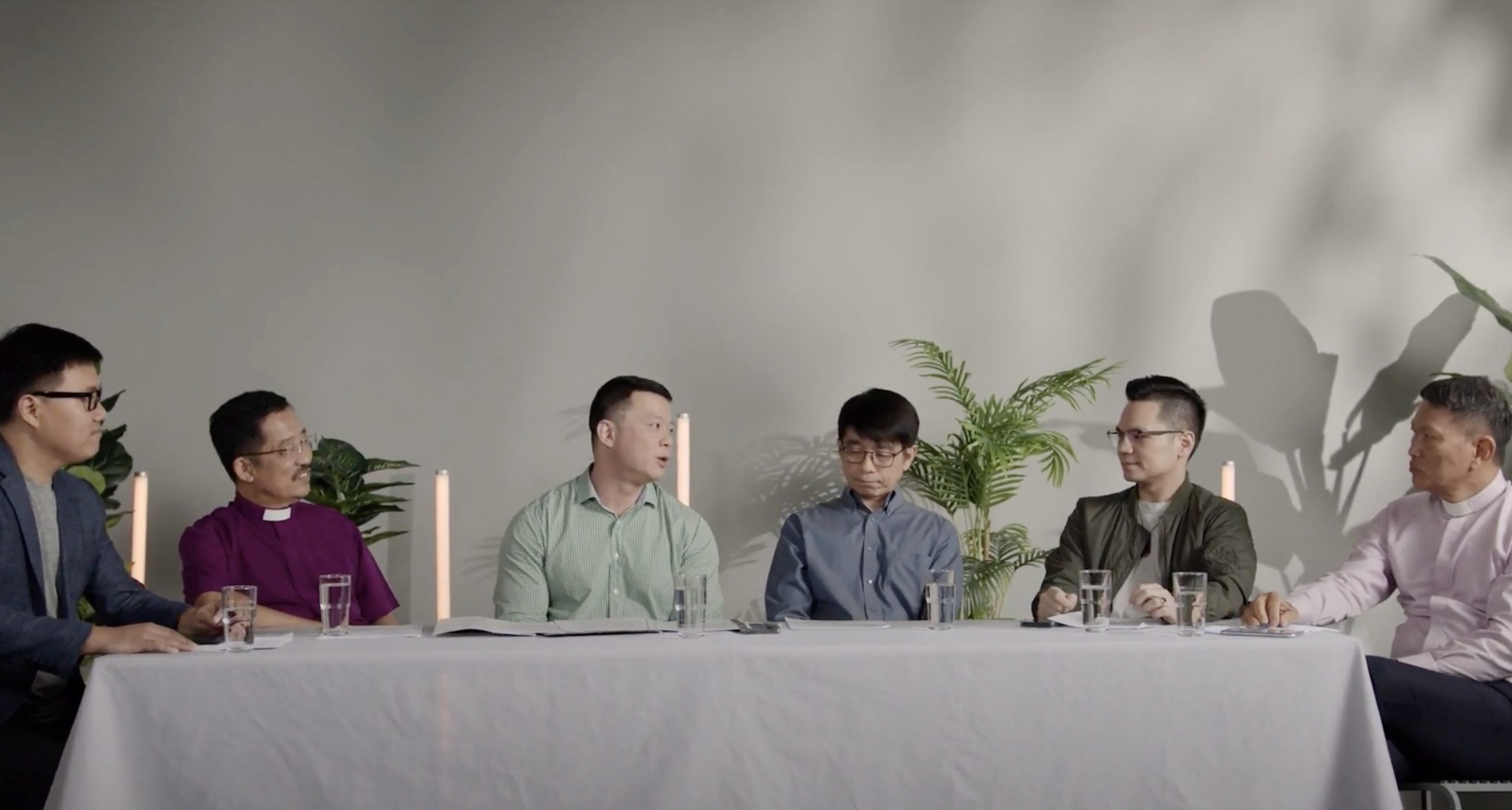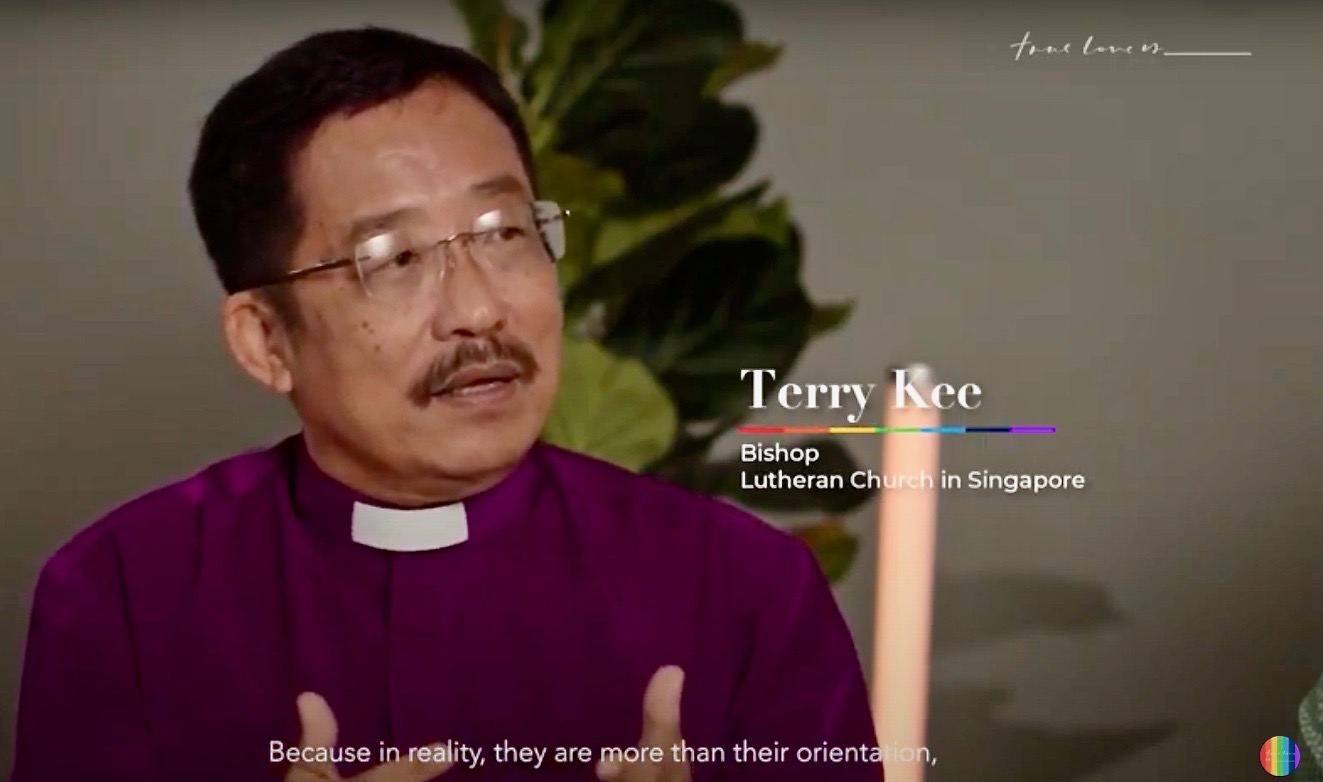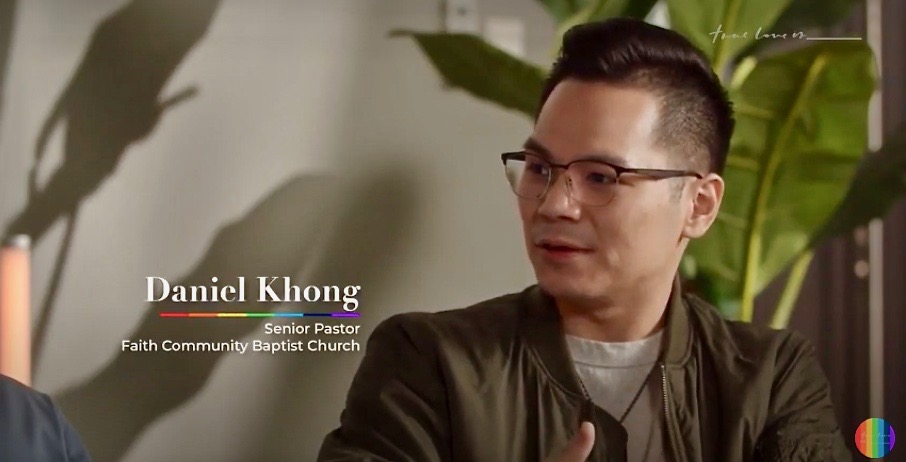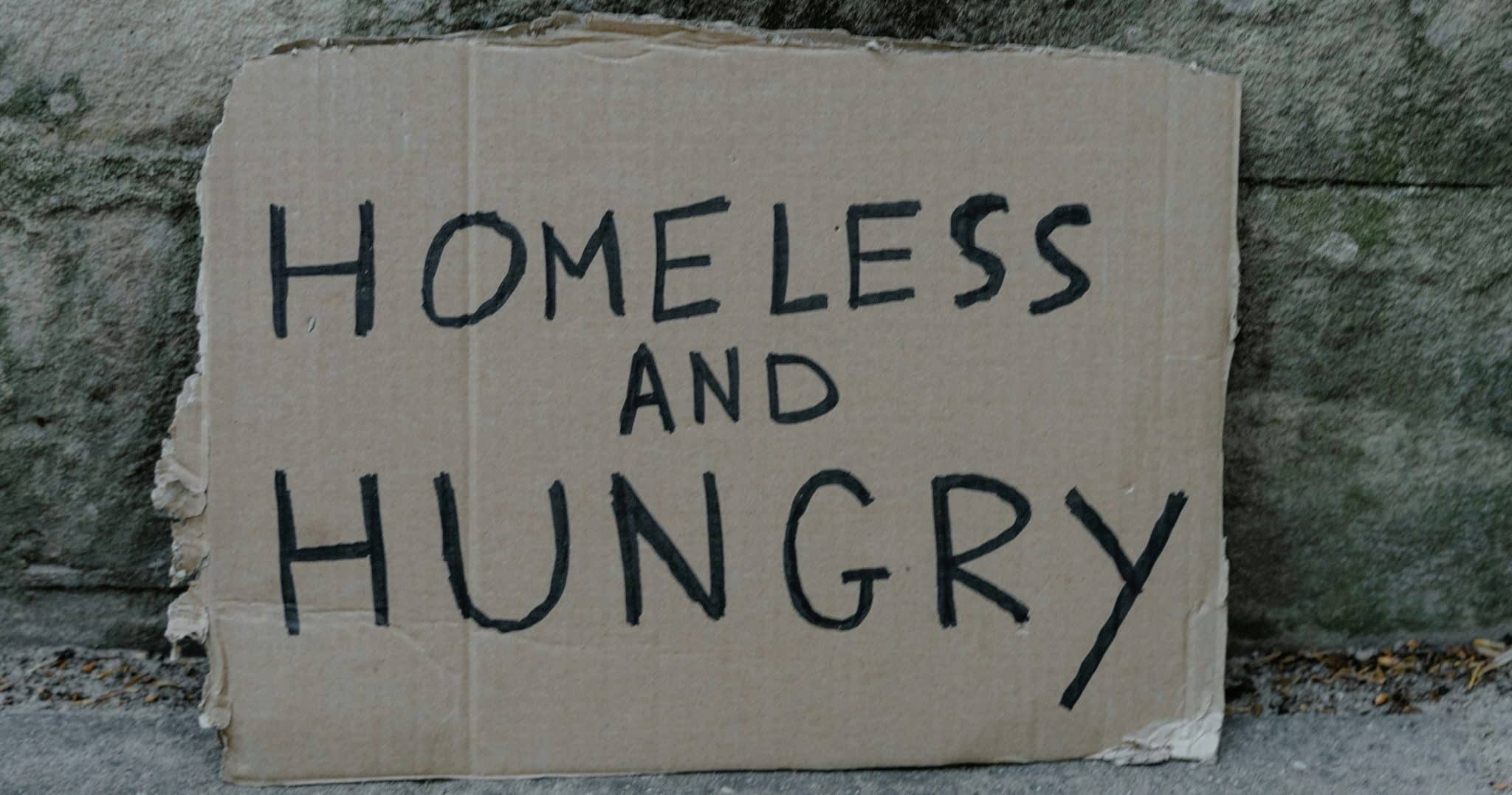The Heart of the Matter: The Church should be a safe place for everyone, including the LGBTQ community, say pastors
Salt&Light // June 29, 2021, 4:09 pm

What can the Church could do better in journeying with the LGBTQ community? Five church leaders share their thoughts in a video dialogue. Screengrab from the Heart of the Matter video.
“I believe we have to repent of our indifference, which is the real root of the issue,” said Reverend Keith Lai.
Rev Lai, Senior Pastor of Covenant Presbyterian Church, was among five leaders from various churches in Singapore who gathered on June 5 to discuss how the Church can better journey with the LGBTQ community.
The five pastors shared their thoughts to five questions put to them by host Tou Chen in a video dialogue, The Heart Of The Matter.
Here is an extract of their dialogue.
Is there anything that the Church could do better in engaging the LGBTQ community?
Senior Pastor of Faith Community Baptist Church Daniel Khong: I think, firstly, we must always have a mindset that there’s always something we could’ve done better.
“We have left a lot of people who were struggling with different issues, isolated, because we don’t struggle as a community.”
Having conversations is something that sometimes, as the Church, we’re not very good at. And when this issue came up, I often hear this phrase: We have to “confront” the issue.
I think this where it gets a little bit confusing, because “confronting the issue”, if it’s not guided, can become confronting a person … someone’s character, someone’s identity.
We need to, as a community, as a Church, struggle through the issue together. And sometimes I think the problem is that we have left a lot of people who were struggling with different issues, isolated, because we don’t struggle through it as a community.
So, I think on our end, one thing that I would have definitely done is to say: Can we have more conversations about this both in public and in private? Let’s sit down.
Let’s hear one another out, let’s try to understand one another. And then we struggle through this issue together.
Senior Pastor of Lighthouse Evangelism Pacer Tan: One of the challenges that I personally have seen in the Christian faith is, every time a new issue comes on, sometimes we forget that the issue represents people.
And the Church typically has always tried to play catch up.
So that’s something that I know has been on my mind, and on other pastors’ minds: How should we better serve our community?
Senior Pastor of Covenant Presbyterian Church Keith Lai: I believe that we have to repent of our indifference, which is the real root of the issue.
The reason we are silent, we are ignorant, is because we are indifferent.
The opposite of love is not hate. It’s indifference.
“I don’t want to be involved, it’s too messy. I don’t want to know too much.” That kind of mindset, we really need to repent of as a Church.

Let’s acknowledge every person as an individual because, in reality, they are more than their gender identity, says former Bishop Terry Kee. Screenshot from Heart of the Matter.
“Homosexuality is wrong, full stop” leaves people without the heart of God and they can feel isolated and rejected. How can this be addressed?
Pastor Tan: Some years ago, one of my youth leaders came up to me.
He said, Pastor Pacer, I’ve got a confession. And he shared with me his life story of how he was having same-sex attraction since he was young. And then how he acted it out. And he was already a youth cell leader in my ministry.
So, for the next few months, we kept conversing. We spoke several times on the phone, had email conversations, and he asked a lot of questions about the faith – about who God is, and so on.
Looking back, the sad truth of the matter was, after about six months of travelling with him, he wrote to me to say: “Pastor, thanks for your help. I didn’t feel condemned by you, but I will be leaving the Christian faith.”
It really shocked me a lot. And the last meeting I had with him was with another co-leader. We were going through a lot of doctrine with him to say: “Do you know what it means to leave the faith?” Looking back now, I can see some mistakes I made.
“If you don’t know how to weep with them, suffer with them, then I don’t think we are in a position to tell them the Truth.”
I’m not saying that I could have retained him as a Christian or follower of Christ. But I was going on doctrinal accuracy rather than looking out for his soul and where he’s really hurting.
For someone on the opposite end, even if they don’t feel we judge them, they really wouldn’t know if we love them. And when I look back, I didn’t show this youth leader the love.
Maybe that would have made a difference. I don’t know. And next time, instead of just using the Bible, though it is true, I need to express that love to someone who’s struggling and say: You know, I really want to care for you here.
So for those of us in youth ministry, get equipped, yes, praise God.
But I think there’s another part which is so key, right? Which is, can you pray that God will give you the supernatural love? Because without that love, you might win the debate, but lose the soul.

We need to create a place in the church where it’s a true family, where whether you’re single or you’re married, you’re in a relationship or not, you don’t need to feel isolated, says Senior Pastor Daniel Khong. Screengrab from Heart of the Matter.
Rev Lai: Recently, I was really convicted by this idea that when we speak the truth in love, it means to speak the truth with tears.
With tears, that means that, if we don’t know how to cry with them, keep your mouth shut.
“If they are believers, they are also fellow brothers and sisters in the Lord.”
If you don’t know how to weep with them, suffer with them, then I don’t think we are in a position to tell them the Truth.
For my church and for fathers I work with, there are two things I’d like to really work at in helping them move forward.
First is to deconstruct – meaning to undo and to tear down, to strip away – all the wrong mindsets that we have in the stereotyping of people in this community, and to change the way we even talk and say things about them, like “praying away the gay”.
The second thing is to reconstruct new appreciation of the complexity of the challenges, the struggles that they face, and to have new understanding, a new way of relating with them, to provide a place where everyone can feel safe.
How would you address the silence in some quarters of the church?
Former Bishop of the Lutheran Church in Singapore Terry Kee: Can we just talk to them as individuals? Their hobbies, what they like, the songs they listen to, ask how they are doing? So that we don’t treat them as invisible.
We acknowledge them as individuals because, in reality, they are more than their orientation, more than their gender identity.
“The truth of the matter is that there will be people who struggle all their life and never get out of it.”
First and foremost, they’re wonderfully and beautifully created by God.
And, secondly, if they are believers, they are also fellow brothers and sisters in the Lord.
Senior Pastor of Church of our Saviour Singapore Daniel Wee: I would like to believe that healthy communities, which includes people with different kinds of struggles, require a certain degree of maturity, which we all should aspire to. We’re not quite there yet.
But I think we should aspire to have the maturity that recognises that there’s a bit of give and take in every community. If it’s just “I’m getting and you’re giving”, it’s just not going to work.
So I would speak to those who struggle: As you come to us, we want to come to you, but it’s not going to be all one way or the other way. But if you’re willing, we can have this conversation, we can grow together, and maybe modify our understanding as we come to understand the challenges better.
And we can work out things, you know, find the best way to reach a better place together.
How will the church go that distance with someone who is struggling for years and years?
Bishop Kee: We expect people to be forgiving, to be gracious to us. How come we cannot be forgiving and gracious to them?
We are thankful to God that He has been gracious to us as often as we repent, as often as we confess. We believe He forgives us. Do we believe that God will also forgive them when they confess?
Rev Lai: I think our Church has the tendency to over-emphasise triumphalism.
Triumphalism means that, at all costs you should be victorious, you should overcome.
I’m not saying it’s wrong that we should be conquerors. But the truth of the matter is that there will be people who struggle all their life and never get out of it.
“First and foremost, they’re wonderfully and beautifully created by God.”
And the challenge for us as a church is: How do we accept people who will never overcome? Who may never overcome in this lifetime?
Do we conclude that maybe they were not born again, or maybe they have no faith? Maybe the Church didn’t help them sufficiently?
But these are very simplistic answers.
So can the church redefine triumphant faith in a more “messy” way? In a more down-to-earth, realistic way? Because we always celebrate those who have made it through and stay that way.
So I think the challenge for us is to rethink the way we look at these people and not to jump to quick solutions or answers and conclusions.
Pastor Khong: I think, again, it comes back to us needing to be that true, godly community.
We need to create a place in the church where it’s a true family, where whether you’re single or you’re married, you’re in a relationship or not, you don’t actually need to feel isolated.
Pastor Tan: “We have to do better, we must do better. And not just for this community, but across the board.”
RELATED STORIES:
How can the church respond better to those with same-sex attraction?
We are an independent, non-profit organisation that relies on the generosity of our readers, such as yourself, to continue serving the kingdom. Every dollar donated goes directly back into our editorial coverage.
Would you consider partnering with us in our kingdom work by supporting us financially, either as a one-off donation, or a recurring pledge?
Support Salt&Light




